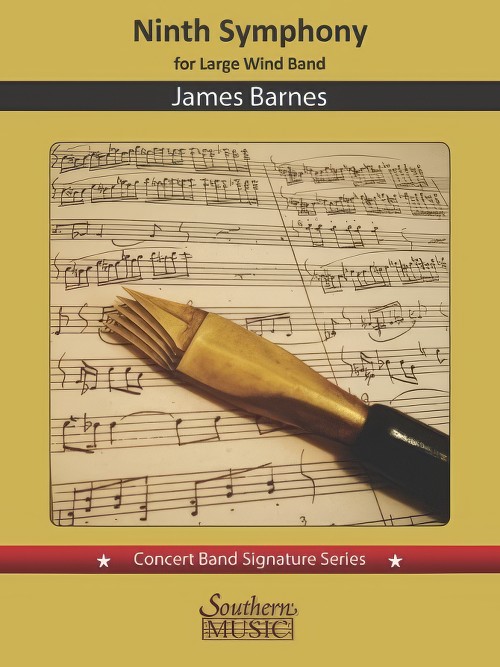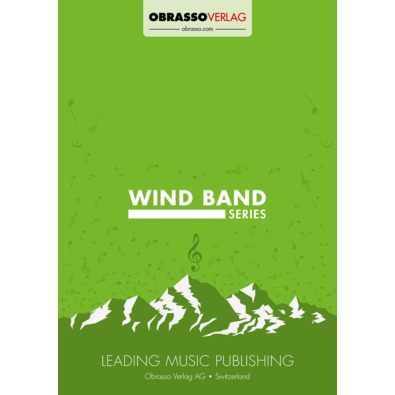Results
-
 £64.35
£64.35The Last Rose Of Summer - Swearingen, James
Reminiscent of some of the great works by Grainger, this setting of an old Irish air is breathtakingly beautiful and sure to touch the hearts of both performers and audience members alike. This highly emotional setting features an occasional trumpet solo that is also cued for flute. Rich harmonies, soaring lines and a well-crafted score make this the kind of work that you'll certainly want your band to experience. Outstanding!
Estimated dispatch 7-14 working days
-
£233.99
Transfiguration - James Curnow
James Curnow explores many domains of sound with this wonderful piece. Four extensive variations, based on the melody of the hymn All Praise to You, Oh Lord, together form a beautiful piece of music for use in church services. The composer has a fresh view of the theme in the various fragments of the melody, from ethereal reflections to passionate joy. The last variation starts softly but energetically, and keeps developing using the last phrase of the melody - until the majestic highlight of this glorious hymn begins.
Estimated dispatch 7-14 working days
-
 £93.50
£93.50Fantasia on a 13th Century Carol - James L. Hosay
A brilliant opener or a rousing finale! Either way, this is the piece that will make memories and stir your audience's comments at your winter concert. A bravura exploration of the well-known 13th century melody March of the Three Kings (also arranged by Bizet as Farandole in L'Arlsienne), the Fantasia On A 13th Century Carol will catch and hold everyone's attention from first note to last. As you may know, James L. Hosay is a master of concert band composition, and many facets of his remarkable talent are clearly evident in this powerful new composition.Magnificent!
Estimated dispatch 7-14 working days
-
 £309.99
£309.99Symphony No. 9, Op. 160 - James Barnes
Premiered on September 21, 2018 in Lawrence, Kansas by the University of Kansas Wind Ensemble (Dr. Paul Popiel, conducting), James Barnes' Ninth Symphony was composed between January and late June of that same year. This large work was commissioned by a consortium of twenty-one college bands, community bands, professional bands and individuals to help mark the 70th birthday of the composer (b. 1949). It is an expansive forty-minute work in four movements, of which the composer writes, This is my last symphony... this work represents a compendium of all that I have learned during the fifty years of composing and scoring for this wonderful new medium: the modern wind band. The first movement, subtitled Elegy, is based around G minor. It is the longest movement of the symphony. Tragic and despondent in character, it is cast in sonata-allegro form. The second movement is entitled Scherzo. Barnes claims that I have always wanted to write a waltz, and that is how this movement is cast, in a modified rondo form in D minor. In contrast to the mood of the first movement, the scherzo is a delightful posy of expansive melody, splashy color, humor and rhythm. The third movement, which is in a modified tertiary form, is entitled Night Music. In contrast to the scherzo, this movement begins with a mysterious incantation, first displayed by solo Alto flute. The music becomes even darker and more mysterious, while overall the movement effectively expresses an otherworldly mood, ending with a solo soprano offstage which suddenly emerges, eerily singing a modified version of the opening incantation. Cast in sonata-allegro form, the fourth movement is most definitely a rousing Finale, beginning with a brilliant fanfare and undergoing several mood transformations before emerging into the final coda, ending the symphony with an energetic splash of color.
Estimated dispatch 7-14 working days
-
 £309.99
£309.99Ninth Symphony (Concert Band - Score and Parts) - Barnes, James
Premiered on 21 September, 2018 in Lawrence, Kansas by The University of Kansas Wind Ensemble (Dr. Paul Popiel, conducting), James Barnes' Ninth Symphony was composed between January and late June of that same year. This large work was commissioned by a consortium of twenty-one college bands, community bands, professional bands and individuals to help mark the 70th birthday of the composer (b. 1949). It is an expansive forty-minute work in four movements, of which the composer writes, "This is my last symphony...this work represents a compendium of all that I have learned during the fifty years of composing and scoring for this wonderful new medium: the modern wind band." The first movement, subtitled Elegy, is based around G minor. It is the longest movement of the symphony. Tragic and despondent in character, it is cast in sonata-allegro form. The second movement is entitled Scherzo. Barnes claims that "I have always wanted to write a waltz," and that is how this movement is cast, in a modified rondo form in D minor. In contrast to the mood of the first movement, the scherzo is a delightful posy of expansive melody, splashy color, humor and rhythm. The third movement, which is in a modified tertiary form, is entitled Night Music. In contrast to the scherzo, this movement begins with a mysterious incantation, first displayed by solo Alto Flute. The music becomes even darker and more mysterious, while overall the movement effectively expresses an "otherworldly" mood, ending with a solo soprano offstage which suddenly emerges, eerily singing a modified version of the opening incantation. Cast in sonata-allegro form, the fourth movement is most definitely a rousing Finale, beginning with a brilliant fanfare and undergoing several mood transformations before emerging into the final coda, ending the symphony with an energetic splash of color. Duration: 40.00
Estimated dispatch 7-14 working days
-
 £84.60
£84.60 -
£114.00
Einsamer Hirte - James Last - John Glenesk Mortimer
The Lonely Sheperd / Le Berger Solitaire
Estimated dispatch 10-14 working days
-
£114.00
-
£114.00
Morgens um Sieben - James Last - John Glenesk Mortimer
Estimated dispatch 10-14 working days
-
 £76.99
£76.99Risoluto - James Barnes
Risoluto is a music term of Italian derivation, first appearing in the mid 1700s. A great many musical terms such as this are in Italian, because many of the important composers from the Renaissance to the Baroque were from the geographic area known today as Italy and spoke some form of Italian. Consequently, performance markings in their published music, widely disseminated through the rest of Europe, were in the language that they best understood. Music marked in this manner is to be played firmly and decisively with firm resolve and little variance from the marked tempo. It can be seen that while there are several stylistic changes in this piece, the tempo varies not a bit, holding firm at Allegro vivo, quarter note at 120, from first measure to last.
Estimated dispatch 7-14 working days
